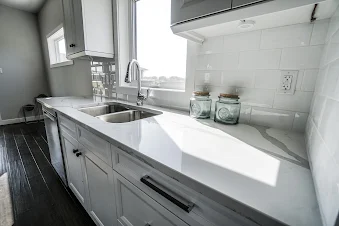When it comes to enhancing the beauty of your kitchen or bathroom, granite countertops are an excellent choice. Their natural elegance and durability make them a popular option among homeowners. However, maintaining the pristine look of granite requires proper care, and one essential aspect of this is using the right cleaner. In this comprehensive guide, we'll delve into the world of DIY granite cleaners – how to make them, why they're beneficial, and the steps to follow for a spotless and gleaming countertop.
DIY Granite Cleaner: A Simple and Effective Solution
The Beauty and Challenges of Granite Countertops
Granite countertops are renowned for their stunning appearance, coming in a diverse range of colors and patterns that can complement any interior design. The lustrous surface adds a touch of luxury to your kitchen or bathroom, instantly elevating the overall ambiance. However, granite is also porous, which means it can absorb liquids and become susceptible to stains, especially if not properly sealed and maintained.
Why Opt for a DIY Granite Cleaner?
Commercial granite cleaners are readily available on the market, but many of them contain harsh chemicals that can compromise the longevity of your countertop's sealant. DIY granite cleaners, on the other hand, offer a natural and effective solution that won't harm the stone or leave behind any residues. Plus, they're budget-friendly and customizable, allowing you to choose ingredients that suit your preferences and cleaning needs.
Key Ingredients for a DIY Granite Cleaner
Creating your DIY granite cleaner is surprisingly simple. You'll require a handful of fundamental elements that are likely already present in your kitchen. Below, I've compiled a roster of essential constituents along with their advantageous qualities:
1. Isopropyl Alcohol: Acknowledged for its disinfection attributes, isopropyl alcohol aids in eradicating germs and bacteria from the surface of your countertop.
2. Distilled Water: Using distilled water prevents mineral deposits that regular tap water might leave behind, ensuring a streak-free shine.
3. Castile Soap: This gentle, plant-based soap acts as a natural cleaner without causing any damage to the granite's surface.
4. Essential Oils: Essential oils like lavender, lemon, or tea tree not only add a pleasant fragrance but also provide additional antibacterial and antifungal properties.
DIY Granite Cleaner Recipes and Application
Here are two effective DIY granite cleaner recipes you can try:
Recipe 1: Isopropyl Alcohol-based Cleaner
Ingredients:
- ½ cup isopropyl alcohol
- ½ cup distilled water
- 2-3 drops of castile soap
- 5-10 drops of essential oil (your choice)
Directions:
1. Mix the isopropyl alcohol and distilled water in a spray bottle.
2. Add the castile soap, which will help in lifting dirt and grime.
3. Drop in the essential oil for a pleasant scent and added cleaning power.
4. Shake well before each use.
5. Administer the concoction onto your granite countertop, then proceed to cleanse it using a gentle cloth or sponge.
6. In the case of tenacious stains, allow the mixture a brief moment to settle before embarking on the wiping process.
Recipe 2: Baking Soda-based Scrub
Ingredients:
- ½ cup baking soda
- Water (as needed to create a paste)
- 5-10 drops of essential oil (optional)
Directions:
1. In a bowl, mix the baking soda with enough water to form a paste.
2. Add a few drops of essential oil if desired, for fragrance and extra cleaning properties.
3. Apply the paste to the stained areas on your countertop.
4. Gently scrub using a soft cloth or sponge in a circular motion.
5. Rinse the area thoroughly and dry with a clean cloth.
Essential Tips for Granite Countertop Maintenance
Using a DIY granite cleaner is just one part of maintaining the beauty of your countertops. Here are a couple more pointers to bear in mind:
1. Thorough Sealing: It's essential to ensure that your granite countertop is adequately sealed. This step is crucial in preventing liquids from penetrating the surface of the stone. A well-sealed countertop is less likely to get stained.
2. Avoid Harsh Cleaners: Stay away from acidic or abrasive cleaners that can damage the sealant and dull the stone's shine.
3. Blot Spills Promptly: In the event of spills, blot them immediately rather than wiping. This prevents liquids from seeping into the stone's pores.
4. Use Cutting Boards: While granite is resilient, using cutting boards for chopping will prevent scratches and preserve the countertop's finish.
5. Regular Dusting: Dust and wipe down your countertop daily to prevent the buildup of dirt and debris.
6. Avoid High Heat: Although granite can withstand heat, it's best to use trivets or hot pads to protect the surface from extreme temperatures.
When to Consult Professionals
While DIY granite cleaners work wonders for regular maintenance, there might be instances where professional intervention is necessary. If your countertop has deep-seated stains, scratches, or cracks, it's advisable to seek the help of a granite restoration specialist. They have the expertise and tools to repair and restore your countertop to its original glory.
Conclusion
A granite countertop is an investment that adds timeless beauty to your home. By using DIY granite cleaners, you not only maintain its stunning appearance but also ensure the longevity of the stone. With the simple recipes and tips provided in this guide, you're well-equipped to take care of your granite countertops the right way. Embrace the natural and effective approach of DIY cleaning, and relish the gleaming elegance of your granite for years to come.
